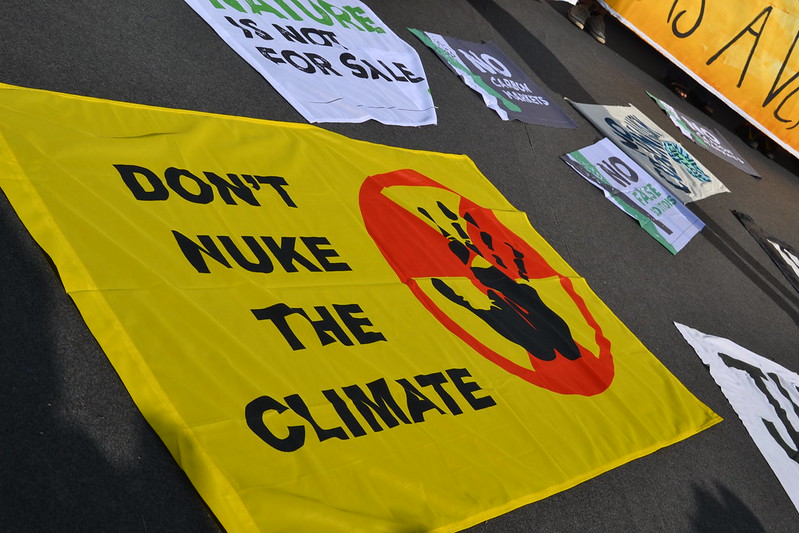Submission of Additional Request and Questions on ADB’s Nuclear Policy Change: ‘Supporting Nuclear Power is Irresponsible’
Today, five organizations—Friends of the Earth Japan, the Japan Center for a Sustainable Environment and Society (JACSES), Citizens’ Nuclear Information Center, the Nuclear Citizens’ Committee, and Green Action—submitted an additional request and a set of questions to the Asian Development Bank (ADB) regarding its policy to lift the ban on support for nuclear power.
The ADB is currently reviewing its energy policy. As part of this review, it is planning to remove the paragraph that “ADB will not finance investments in nuclear energy” and to begin providing support for nuclear energy.
Under the current policy, the ADB cites “risks related to nuclear proliferation, waste management and safety issues,” and “very high investment costs relative to ADB’s resources” as reasons for not financing nuclear energy. However, these circumstances have not changed, and the ADB has yet to explain why it intends to change its policy despite this. Furthermore, is it not irresponsible for the ADB to support developing countries in introducing nuclear power, a technology that carries many problems they cannot resolve?
For more details, please see below.
August 22, 2025
Asian Development Bank (ADB)
President Masato Kanda
Board of Directors
Submission of Additional Request and Questions Regarding ADB’s Policy Change on Nuclear Power
Dear President Kanda and Board of Directors,
As stated in the letter we recently sent (attached), we are deeply concerned that the ADB is moving to delete the provision in its current energy policy that excludes financing for nuclear power, and to shift toward supporting the nuclear sector.
We participated in the virtual consultation meeting held on August 21, where we expressed our concerns and raised several important questions as outlined below. Unfortunately, we did not receive reasonable responses from ADB staff. Not only our questions, but also many of the fundamental and serious issues raised by other participants were not addressed in any meaningful way by the ADB.
If the Bank intends to undertake such a major policy shift, it is essential, at a minimum, to provide clear explanations on these points.
We therefore resubmit our questions in writing:
- The ADB has consistently cited “risks related to nuclear proliferation, nuclear waste, and safety issues” as well as “very high investment costs relative to ADB’s resources” as the reasons for its policy of not financing nuclear power. These circumstances remain unchanged today. Why then is the policy being revised?
- Much expectation has been placed on Small Modular Reactors (SMRs). However, SMRs are even more expensive than conventional reactors and carry heightened risks of nuclear proliferation. Has the ADB taken these issues into account?
- Nuclear power generation produces radioactive waste that requires management for tens of thousands of years, and in most countries, including Japan, even the selection of final disposal sites has not been achieved. How can support for nuclear power in developing countries be justified under these circumstances?
- The ADB has stated that “if DMCs choose nuclear power, the ADB will support them.” Yet, such a choice by developing countries necessarily presupposes the existence of financiers. Given the immense risks, high costs, and unsolved challenges, would it not be irresponsible for the ADB to support nuclear power?
- Will the ADB provide financing for individual nuclear construction projects?
- The proposed revisions concerning nuclear power represent a fundamental change from the current policy, and should not be considered a minor modification under the term “Amendment.” Is it not inappropriate to proceed under the current process?
We would greatly appreciate your responses to these questions, in addition to those we attached to our earlier letter.
Furthermore, given the high level of public interest in Japan and the necessity for the ADB to listen to the voices of Japanese society—especially as Japan has experienced a nuclear disaster—we respectfully request that the ADB hold another consultation meeting specifically for Japanese stakeholders, with interpretation provided.
Sincerely,
Ayumi Fukakusa, Executive Director, Friends of the Earth Japan
Yuki Tanabe, Program Director, Japan Center for a Sustainable Environment and Society (JACSES)
Hajime Matsukubo, Secretary General, Citizens’ Nuclear Information Center
Shoko Murakami, Chief Secretary, Citizens’ Commission on Nuclear Energy (CCNE)
Aileen Mioko Smith, Executive Director, Green Action
cc: Mr. Katsunobu Kato, Minister of Finance, Japan
